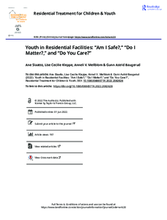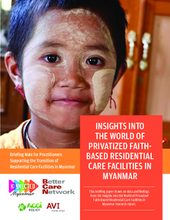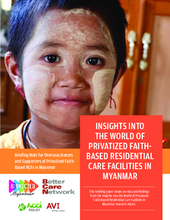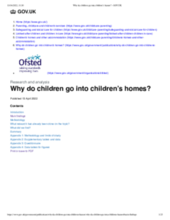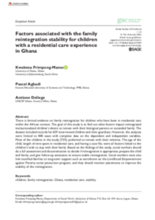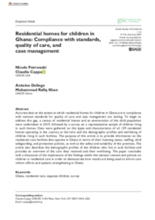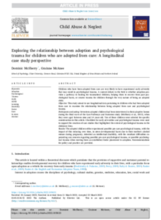Displaying 51 - 60 of 1460
Several youth facilities have devoted considerable resources to improving the quality of practice and the interest in understanding the safety needs of youth in residential care has grown. However, there is limited research that considers how youth in residential facilities themselves define and experience safety, what their safety concerns are, and how they would like systems and staff to respond to their needs. Therefore, this current study investigated youth perceptions of safety in residential facilities in Norway and their experiences of and reaction to staff behaviors and attitudes.
Individual studies suggest most children and youth in residential care centres (RCCs) have living parents, and parental death is not the primary antecedent to placement in residential care. The goal of the present review was to examine the literature to better understand the primary antecedents to placement in RCCs overall. One hundred thirty-two studies, including 60,683 children in 47 nations meet eligibility criteria for inclusion for the overarching review of antecedents of placement.
This briefing paper draws on data and findings from the Insights into the World of Privatized Faith-Based Residential Care Facilities in Myanmar research report.
This briefing paper draws on data and findings from the Insights into the World of Privatized Faith-Based Residential Care Facilities in Myanmar research report.
This study looked at how well matched children in England are to their homes and the extent to which their participation, views, wishes and feelings are considered in the decision-making process. The study looked at a small group of children who have a very wide and diverse set of needs and who live in children’s homes that were visited by Ofsted inspectors in late 2019.
There is limited evidence on family reintegration for children who have been in residential care within the African context. The goal of this study is to find out what factors impact reintegrated institutionalized children’s desire to remain with their biological parents or extended family.
The purpose of this article is to provide information on the residential care facilities that operate in Ghana in terms of their licensing status, staffing, child safeguarding, and protection policies, as well as the safety and suitability of the premises. The article also describes the demographic profiles of the children who live in such facilities and provides an overview of the care they received and their well-being.
This study aimed to use longitudinal data pertaining to children who had been adopted from care to examine the relationship between being adopted from care and psychological trauma.
This webinar was hosted by the Transitioning Residential Care Working Group of the Transforming Children’s Care Global Collaborative Platform and showcased learning around the transition of residential care services.
This brief documents the first stages of a learning process between Changing the Way We CareSM and the Mexican Province of the Congregation of the Sisters of Our Lady of Charity of the Good Shepherd as the Sisters moved forward in their transition process. It is written for practitioners and organizations, including Catholic actors interested in supporting or engaging in a transition process with women religious and also provides useful information for those engaging in transition with non-faith actors.

